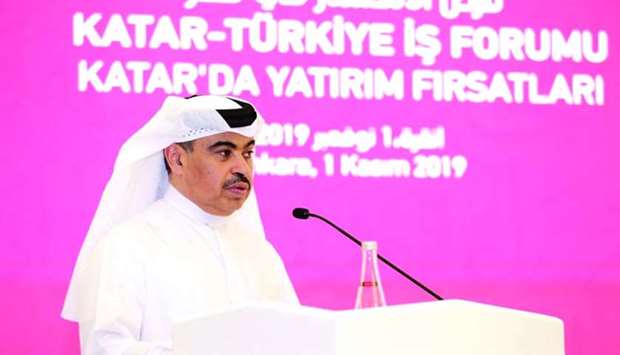*Bilateral trade jumped by 78.8% to reach QR8.7bn in 2018, compared to QR4.8bn in 2017
Qatar-Turkey bilateral relationship has “reflected positively” on bilateral trade, which grew by 78.8% to reach QR8.7bn in 2018, compared to QR4.8bn in 2017, said HE the Minister of Commerce and Industry Ali bin Ahmed al-Kuwari.
In his remarks at the Qatari-Turkish Business Forum in Ankara, the minister said, “During the same period, Qatari exports to Turkey grew by 99% while Qatari imports from Turkey increased by 64.9%.”
On the investment level, the minister “praised” Turkish companies for contributing to the Qatari economy, noting that some 499 Qatari-Turkish joint companies are currently operating in trade, contracting and information technology sectors, while 37 wholly-owned Turkish companies are operating in the construction and industrial sectors.
The expansion of bilateral trade and investment co-operation follows the ratification of several agreements that had a profound impact on promoting bilateral relations and paving the way for comprehensive strategic co-operation. These agreements include the Trade and Economic Partnership Agreement (TEPA) that was signed during His Highness the Amir Sheikh Tamim bin Hamad al-Thani’s historic visit to Turkey last November.
Al-Kuwari noted that the agreement played a key role in facilitating the exchange of goods and services and promoting investment co-operation.
In this context, he stressed the importance of the memorandum of understanding that the governments of Qatar, Turkey and Iran signed in 2017 to facilitate international transport and transit traffic, which is pivotal to streamlining the flow of goods and commodities by reducing transport time, costs and the required procedures.
On the other hand, Qatar has highlighted the importance of promoting economic diversification and its contribution to reducing geopolitical and economic fluctuations that affect the economies of the region and the world.
Qatar has established a comprehensive strategy to diversify its income source by supporting vital economic sectors, and investors, through the implementation of a set of programmes and policies aimed at opening Qatar’s economy to attract companies and channel foreign direct investment into priority sectors, in line with the State’s economic plans.
Qatar has introduced key amendments to business regulations and legislation that allow foreign investors up to 100% ownership in all economic, commercial and real estate activities.
In parallel, Qatar has sought to open its economy to the world by modernising its infrastructure to meet the needs of companies and bolster trade with its various partners around the globe. It has been supported in this aim by Qatar Airways, which operates a fleet of more than 230 aircraft that fly to over 160 destinations worldwide through the Hamad International Airport, which will accommodate 50mn passengers a year once its expansion is complete.
Qatar is also seeking to open its economy through the development of the Hamad Port, which plays a pivotal role in linking the nation to the world's major economies through direct shipping lines, further cementing Qatar’s position as a transit hub with links to more than 40 ports in three continents, the minister said.
Qatar also offers access to economic and logistics zones in strategic locations in close proximity to the HIA and Hamad Port, as well as a high-speed road network designed in line with the highest international standards.
These plans have contributed to positive changes in the structure of the Qatari economy, as evidenced by Qatar’s ranking on several international indicators.
Quoting the World Bank, al-Kuwari said Qatar’s economy is expected to grow by about 2% in 2019, and 3% in the medium term, driven by growth in the services and construction sectors as Qatar pursues the implementation of projects within the framework of its National Vision 2030, and preparations to host the 2022 FIFA World Cup.
In parallel, Qatar's foreign trade sector witnessed remarkable growth in 2018, with the trade balance recording a surplus of $52bn, an increase of 40% compared to 2017, while Qatari exports increased by 25% last year.
The forum featured a presentation by the Qatari delegation highlighting the business environment and investment opportunities in Qatar.
Meanwhile, al-Kuwari met Ruhsar Pekcan, Turkey’s Minister of Trade on the sidelines of the Qatari-Turkish Business Forum in Ankara, which was inaugurated by HE the Prime Minister and Minister of Interior, Sheikh Abdullah bin Nasser bin Khalifa al-Thani on Friday. It was attended by other dignitaries including Turkish Vice-President Fuad Oktay.

